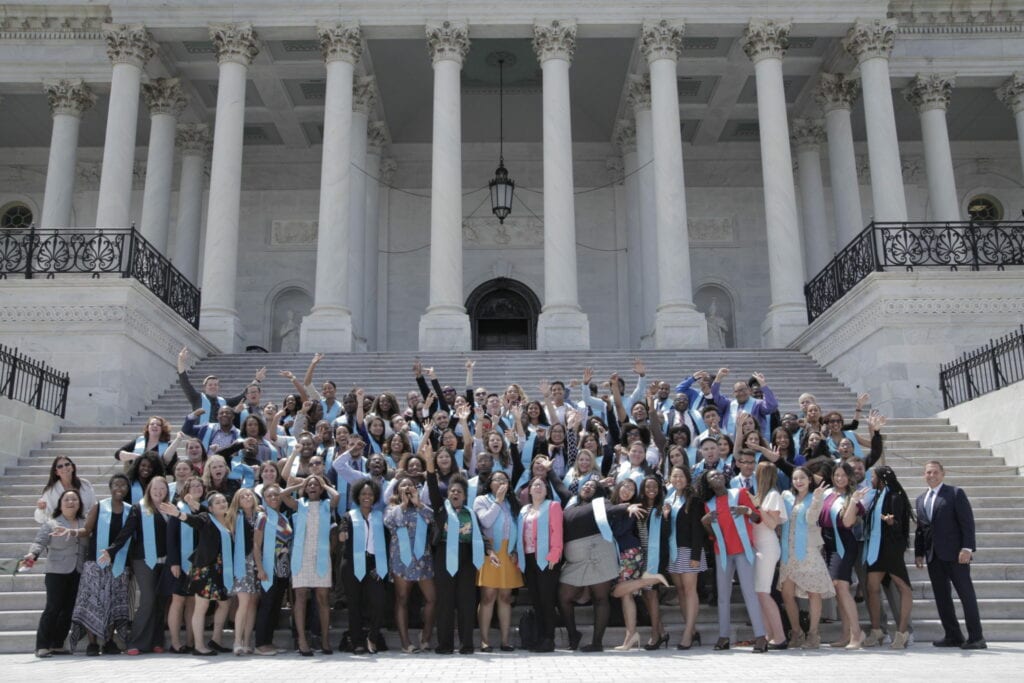
Each May, the Congressional Caucus on Foster Youth introduces a resolution to recognize May as National Foster Care Month. Last year the resolution was cosponsored by more than 130 Members of Congress. In addition to re-introducing this important resolution to call attention and raise awareness about this issue, the Congressional Caucus on Foster Youth will be hosting a range of events in May, including a panel on May 23rd to discuss kinship placement and navigator programs which will also be streamed on Facebook Live.
The National Foster Youth Institute (NFYI, www.nfyi.org) is gearing up once again to bring over 100 current and former foster youth, selected from a nationwide pool of applicants to Washington D.C. for a week of leadership training sessions, workshops on activism, and legislative meetings, culminating in an opportunity to spend a day “shadowing” their individual Congress members. Shadow Day attendees, some as young as 18, have all spent time in the foster care system and will share their experiences, while advocating for reforms in the child welfare system, both in their district and nationwide.
NFYI creates the Shadow Day Program each year, in partnership with the Congressional Caucus on Foster Youth, providing a forum for members of Congress to discuss and develop policy recommendations which strengthen the child welfare system and improve the overall well-being of youth and families. Co-chaired by Rep. Karen Bass (D-CA), Rep. Tom Marino (R-PA), Rep. Brenda Lawrence (D-MI), Rep. Diane Black (R-TN), and Rep. Jim Langevin (D-RI), the bipartisan Congressional Caucus on Foster Youth brings together over 100 Members of Congress to discuss the challenges facing all foster youth and develop bipartisan policy initiatives.
NFYI’s Shadow Day Program has trained a corps of foster youth alumni across the nation who have developed chapters in their home districts and partnered with local leaders and organizations to educate policymakers to addresses chronic problems within the national, state, and local child welfare systems.
Rep. Karen Bass (D-CA, 37th), during Shadow Day 2017, stated that government essentially becomes “the parents” when it puts children in foster care, and then “washes our hands of them” once they turn 18.“
Any time a foster youth falls through the cracks, then the government is really responsible because when we remove children from their parents, we — meaning the government — become the parents, we are responsible for them,” Bass said on the House floor. “So, we’re working on legislation to improve that.”
No one knows more about the pitfalls of our nation’s child welfare system than those who grew up in it. These young people are coming to D.C. to share their stories both – their challenges with abuse, trafficking, overmedication, or homelessness – and their successes with mentorship, adoption, family reunification, community activism and independent living. The goal is to help Congress understand how to improve the child welfare system.
“National Foster Care Month is a month to honor the successes and challenges of the more than 400,000 foster youth across the country and to acknowledge the tireless efforts of those who work to improve outcomes for children in the child welfare system. Making sure that all children have a permanent and loving home is not a Democrat or Republican issue—it should be an American priority. This May, we come together to celebrate the experiences of the youth who are in, or have been in, the child welfare system and raise awareness about their needs.” – Bipartisan Congressional Caucus on Foster Youth

